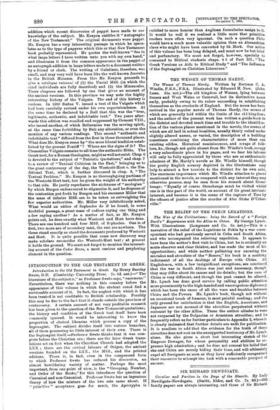INTRODUCTION TO THE OLD TESTAMENT IN GREEK.
Introduction to the Old Testament in Greek. By Henry Barclay Swete, D.D. (Cambridge University Press. 7s. Gd. net.)—" The literature of the subject is," as Professor Swete says, "enormous." Nevertheless, there was nothing in this country before the appearance of this volume in which the student could find a serviceable account of it. In fact, the neglect with which it has been treated is not creditable to British scholarship. Possibly this may be due to the fact that it stands outside the province of controversy. A certain amount of not very profitable research has been given to the question of the New Testament quotations; the history and condition of the Greek text itself have been commonly ignored. It would be interesting to know the proportion of clerical libraries which possess a copy of the Septuagint. The subject divides itself into various branches, all of them possessing no little interest of their own. There is the Septuagint itself.—Professor Swete thinks that it was com- plete before the Christian era ; there are the later Greek trans- lations set on foot when the Christian Church had adopted the LX X. ; there are the critical labours of Origen, the ancient versions founded on the LX X., the MSS., and the printed editions. There is, in fact, even in the compressed form to which Professor Swete has reduced his discussion, an almost bewildering variety of matter. Perhaps the most important, from one point of view, is the "Grouping, Number, and Order of the Books," for this introduces the question of Canonical and non-Canonical. Professor Swete has an ingenious theory of how the mixture of the two sets came about. If " primitive " acceptance goes for much, the Apocrypha is
entitled to more honour than Anglican formularies assign to it. It would be well if we realised a little more that primitive readers were often very ignorant. On such a question Philo would have a much more valuable opinion than an Alexandrian slave who might have been converted by St. Mark. Our notice of this volume has been long delayed, and must now be but brief and perfunctory. We must not forget, however, specially to commend to Biblical students chaps. 4 5 of Part III., "The Greek Versions as Aids to Biblical Study" and "The Influence of the Septuagint on Christian Literature."






























































 Previous page
Previous page